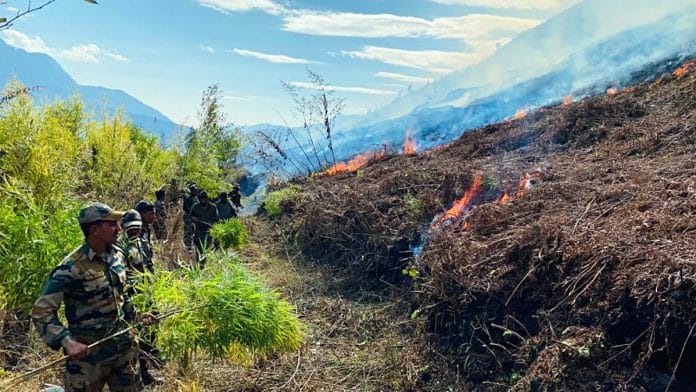New Delhi: A parliamentary panel has pulled up the environment ministry for failing to explain why vacancies in state forest departments haven’t been filled, calling it one of the “very crucial reasons” behind their “inability” to tackle forest fires.
The Standing Committee on Science, Technology and Environment, Forests and Climate Change had, in a 2019 report, expressed concern over the “lack of human resources in forest departments of respective states” and “large stretches of forests” being affected during the fire season.
On Wednesday, the Ministry of Environment, Forests and Climate Change submitted a report to the Parliament outlining actions taken since the committee’s 2019 recommendations. The report said the ministry issues “advisories to all states/UTs before fire season” and provides financial support to state departments.
The standing committee, however, did not accept the government’s response and said, “The ministry has not responded to the committee’s observation regarding lack of human resources in forest departments of states. The ministry should not ignore this important aspect and submit the action taken (report) on the recommendation of the committee.” The committee’s responses were submitted in Parliament along with the ministry’s report.
The committee also pointed out that the ministry merely “noted” its recommendations on assessing how much land is available for afforestation purposes, but did not respond to it.
According to data presented in Parliament in July, forest fires in India have been on the upswing over the last few years.
On the issue of thermal power plants and coal mines around the Tadoba Andhari Tiger Reserve in Maharashtra, the government said the matter would be taken up by the Environmental Impact Assessment Division, Ministry of Environment, Forest and Climate Change.
Also read: Everything should be done to ensure protection of forests, animal habitats, says PM Modi
On afforestation
The committee also questioned the ministry on “insufficient budget allocation” for a national afforestation programme.
In its 2019 report, the committee had cited “insufficient budget allocation” for the National Afforestation Programme (NAP) — a scheme aimed at ecological restoration of degraded forests, and recommended that the ministry ensure adequate funding for the same.
In its response, the ministry agreed that finance was “insufficient” during the last three years, adding: “However, there has been an increase in allocation during this period.”
This increase in allocation comes after the NAP was merged with another scheme — the Green India Mission, which focuses on restoring forest cover and enhancing India’s carbon sinks.
According to data in the ministry’s report, allocations went up to Rs 160 crore in 2018-2019 from Rs 80 crore at the revised estimate stage (the second stage of allocation, before approval) in 2017-2018.
Since 2015, when the Green India Mission (GIM) was launched, Rs 237.067 crore has been released under GIM to 12 states for carrying out GIM activities, the government said in the report.
On the issue of human-wildlife conflict, the ministry said it has approved a pilot project on immuno-contraception “for controlling the population of wild animals responsible for damage and destruction of crops, namely elephants, wild boars, monkeys, and nilgai.”
(Edited by Gitanjali Das)
Also read: Amazon habitats are shrinking due to increasing forest fires & deforestation, study says






